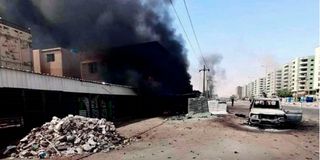The hidden wounds of sexual violence in Sudan’s war

Smoke rises from a building next to a damaged car on a street in Khartoum, Sudan. Gender and human rights activists have raised the red flag over the skyrocketing number of women and girls experiencing sexual violence due to the ongoing war in the country.
War has been raging for the last 11 months in Sudan between the country’s army (SAF) and its military rival, the Rapid Support Forces. Almost half a million people have fled from the West Darfur region to neighbouring Chad, where our organisation, Doctors Without Borders/Médecins Sans Frontières (MSF), provides medical care near the border.
As health workers, we have witnessed the consequences of the horrific wave of violence that led many people to flee West Darfur. Women and girls have described being raped, beaten, detained, and forced to witness the killings of loved ones by groups of armed men.
Many have suffered hidden wounds, physically and psychologically, and now live in almost total destitution among a vast refugee population in makeshift camps. We are highlighting our analysis of the accounts of sexual violence survivors to call for an urgent international response to their needs.
Between July and December 2023, 135 of the patients who presented to an MSF medical facility in eastern Chad disclosed that they were survivors of rape. All are women or girls, between 14 and 40 years old, and most were attacked before their arrival in Chad. The attackers were armed in 90 per cent of cases.
“In Sudan, they killed without hesitation, even children, I saw it with my own eyes,” said one refugee who sought safety in the border town of Adré. “They raped women, also in groups. They would kill them if they resisted. If they entered a place where there were 20 men, they killed them all. I focus on God to help me.”
We fear we have only seen a tiny fraction of the sexual violence in the region. More survivors may not come forward due to the risk of being attacked again or being ostracised by their communities.
Of the patients treated by MSF, nearly a quarter report having suffered at least one sexual assault. More than 40 per cent were raped by multiple attackers. Some explain how multiple men participated: making threats, holding the victim down, or standing guard during the rape.
Half of the survivors were at home when they were attacked. Thirty-three reported additional acts of violence during their rape, either against themselves or against a member of their family. Fathers who tried to protect their daughters were often injured, mothers were threatened with death, and victims were beaten before and afterwards.
Daily activities
Other women were assaulted during their daily activities, such as gathering firewood, or as they tried to escape the conflict. We heard two accounts of armed men taking displaced women to a building where they were gang raped; the women died as a result.
A total of 13 patients have described being kidnapped. These detentions ranged from one night to several months, with some forced to perform domestic chores, or tied up during the day and raped at night.
One in ten survivors reported a theft associated with the attack. Some reported abusive full-body searches, including of women’s genitals, to steal money or valuables. Attacks sometimes target vulnerable people, including pregnant people or those with disabilities.
For many survivors, the trauma is compounded by other traumatic events and by grief for people they lost.
One woman explained that her neighbour's house had been set on fire, killing the ten people inside. Others speak of seeing and smelling corpses near their homes and on the roads. At night, in a hospital where we work, women can be heard screaming in their sleep, “They are coming, they are coming!”
When they are seen by our medical staff, patients report loss of sleep and appetite, generalised pain, and anxiety, particularly when they have not heard from a family member. Many fear becoming pregnant following the attack, and indeed 30 per cent have had a positive pregnancy test.
The high mortality rate during the conflict in West Darfur has left many women as the sole breadwinners of their families. We are seeing acute malnutrition, mainly among young children. Large-scale food distributions are needed, but the World Food Program is suffering globally from a lack of funding.
Even then, food is not enough. People who have found refuge in Chad urgently need access to supplies and services, including clean water, toilets, hygiene materials (including menstrual hygiene items), and a sense of security. Above all, women who have been sexually assaulted must not be forgotten victims of this war.
Only then can they begin to find any semblance of peace after this deluge of violence.
By Nelly Staderini, Clemence Chbat, Pamela Were And Françoise Duroch
Nelly Staderini and Clemence Chbat are reproductive health advisors with MSF, based in Geneva and Paris, and Pamela Were is a midwife with MSF, based in Kisumu, Kenya, with experience working in Chad in 2023. Françoise Duroch is the head of the research unit of MSF in Geneva




